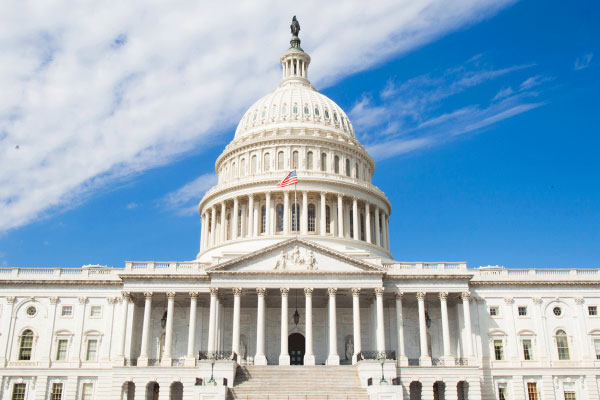
The U.S. Capitol Building.
U.S. Reps. Jim Langevin (D-R.I.), Karen Bass (D-Calif.) and Don Bacon (R-Neb.) sent House leadership a letter yesterday urging consideration of “the needs of current and former foster youth as youth continue to address the novel coronavirus (COVID-19) outbreak.”
While light on numbers, the letter offered a sketch of what a broader spending package to respond to COVID-19’s anticipated ravaging of the child welfare system may look like.
The members first applauded the inclusion of a provision in this week’s Families First Coronavirus Response Act that boosts the federal share of spending on Title IV-E, the largest pipeline of child welfare funding, but pointed to a number of gaps in services that could lead to disastrous outcomes for children, youth and families connected to the child welfare system as as the coronavirus roils the country. There are roughly 437,000 children living in foster care today. Nearly 20,000 “age out” of the system every year without permanent connections, meaning that there are more than 100,000, 19- to 24-year-olds with this experience who are particularly vulnerable at this time.
“We are concerned that during this time of economic and social uncertainty, that there may be an increased number of disrupted adoptions and children placed in the foster care system,” the members wrote.
Bacon, who adopted two of his four children out of foster care himself, was deeply touched by the danger posed to foster youth and caregivers alike.
“So many of our foster youth have zero support once they reach 18 and 19 and I want to make sure we provide them and their families with transitional assistance,” Bacon said in an email statement. “I know that at 18 I needed help, and I was fortunate to have that support. As a foster-to-adopt parent, I have a heart for these kids who age out of the system. Unfortunately, they are the most vulnerable for homelessness and unemployment and I want to help them and their foster families have hope for their futures as adults.”
Heather Zenone, a senior policy adviser for Rep. Bass, said the letter was written “because we want to make sure that foster youth aren’t left out and aren’t bearing the heaviest burden of the crisis. There are so many holes in the safety net already for foster youth.”
Top of the list was increasing funding to Title IV-B of the Social Security Act, a $703 million stream that is used for a variety of services including child protection, family preservation, reunification and post-adoption. The letter did not include any numbers as to the increases Langevin, Bass and Bacon sought for Title IV-B or the other recommended priority areas.
Among those other areas was support for former foster youth receiving federal support as they work toward a college degree. The letter calls for increased funding and flexibility to the Chafee Education Training Voucher Program, which is funded at $45 million per year, and estimates that as many as 10,000 current and former foster youth currently live on college campuses.
Additionally, the letter calls on Congress to provide the “Departments of Health and Human Services; Housing and Urban Development; and Agriculture with the funds and authority to temporarily waive program restrictions that could result in homelessness, food insecurity, or inadequate health care for current and former foster youth and their caregivers.”
Daniel Heimpel can be reached at [email protected].





